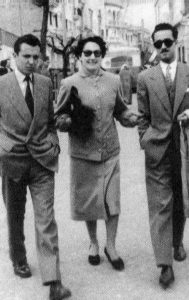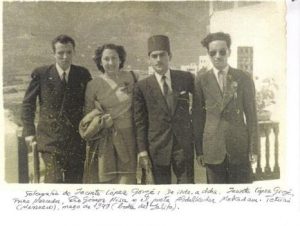Trinidad (Trina) Mercader (Alicante 1919 – Granada 1984)
A Spanish poet and founder of the bilingual journal Al-Motamid. Verso y Prosa. In 1936, she travelled to the Moroccan coastal town of Larache – then under the Spanish Protectorate (1912-56) – to visit some relatives, but could not return to her natal Alicante (in the Levantine region of Valencia) due to the eruption of the Spanish Civil War (1936-39). Mercader founded Al-Motamid in 1947, and a group of Spanish and Moroccan poets such as ‘Abd al-Qadir al-Muqaddam and the professor of Arabic literature Ibrahim al-Ilghi, playwright and translator Idris Diyuri, the future founder and editor of Ketama, Jacinto López Gorjé, and the Melilla-based poets Pío Gómez Nisa and Eladio Sos. In 1953, Mercader and the headquarters of the journal moved to the capital of the Spanish Protectorate, Tetouan, where she met Muhammad al-Sabbagh (see below – put link?). That year she won the Marruecos poetry award established by the colonial authorities. Mercader also wrote short stories and essays, and establihsed the publishing house Itimad, named after the eleventh-century Andalusi poet I‘timād al-Rumaikīyya, consort of Muḥammad Ibn ‘Abbād al-Mu‘tamid.
Muhammad al-Sabbagh / Mohamed Sabbagh (Tetouan 1929 – Rabat 2013)
A Moroccan poet and intellectual who played a pivotal role in both Al-Motamid and Ketama. Al-Sabbagh received a traditional education, and started publishing in Tetouani Arabic newspapers and journals like al-Ānis, al-Anwār, al-Rīf, al-Miṣbāḥ, and al-Nahār in the late 1930s. Throughout the late 1940s and 1950s he also published in literary journals from Tunisia, Lebanon, and the Mahjar (Arab diaspora in the Americas). His poetic anthology al-‘Abīr al-multahab (Passionate Scent, 1953), with a preface by the Lebanese poet Bulus Salamah, became very well known in the Middle East. Al-Sabbagh’s literary corpus includes stories, children’s literature and literary criticism, in addition to poetry, which he cultivated most when he was the editor of the Arabic section of Al-Motamid and Ketama. Al-Sabbagh was also a prolific translator into Arabic of Spanish poets and critics, such as Carmen Conde (Al-Motamid 27), Pío Gómez Nisa (Al-Motamid 28), Gerardo Diego (Ketama 4), Adriano del Valle (Ketama 5), Enrique Azcoaga (Ketama 12), Dámaso Alonso (Ketama 8) and others. He was also one of the most important mentors of Muhammad Shukri (Choukri), as the latter highlighted in an interview in Hadha Huwwa (1994, 11:30)
Jacinto López Gorjé (Alicante 1925 – Madrid 2008)
A Spanish poet and critic, he was born in Alicante but moved to Melilla as a child. In Melilla he founded the literary journal Manantial (Water Spring) and in 1953, after having lived in the Riffian town of Ketama, he established the journal Ketama in the capital of the Spanish Protectorate Tetouan. López Gorjé collaborated with numerous Spanish literary journals and in 1985 he edited, together with Moroccan writer Mohamed Chakor, Antología de relatos marroquíes en lengua española (An Anthology of Hispanophone Moroccan stories).

From left to right: Jacinto López Gorjé, Trina Mercader and Muhammad al-Sabbagh in Tetouan (n.d.). Source: Barce (2015).

The handwritten capture reads: “Photograph of Jacinto López Gorjé: from left to right Jacinto López Gorjé, Trina Mercader, Pío Gómez Nisa, and the poet ‘Abd al-Qadir al-Muqaddam, Tetouan (Morocco), May 1949 (wedding of the Khalifa [the deputy of the Sultan in the Protectorate system]). Source: Fernández Gomá (2014).
A Syrian poet who settled in Chile as a child, he was the translator of prominent Arab authors such as Jubran Khalil Jubran into Spanish. Shuwaqi’s best known work is the autobiographic Memorias de un emigrante (The Memories of an Inmigrant, 1942). He also wrote stories, novels, poetry and critical essays. He founded and directed the Arab-Chilean journal La Juventud (Youth, 1916-1920) and the Friends of Arab culture circle (1940-50), which later became the Chilean-Arab Culture Institute. Shuwaqi was a freemason and a member of Chilean Writers’ Union and Chilean Writers’ Society, where he acquainted a number of prominent writers. Shuwaqi collaborated with Al-Motamid as a writer and a translator in the 1950s, and he played a pivotal role in orienting the journal toward contemporary Arabic poetry.
Leonor Martínez Martín (Barcelona 1930 – 2013)
An Arabist and university professor from Barcelona, her doctoral thesis was a critical edition of a Medieval Arabic manuscript kept in the Escorial monastery in Spain, Kitāb al-madd w-al jazr (Treaty of the tides) by the Andalusi Ibn al-Zayyāt al-Tādilī (d. 1230). Martínez Martín was then awarded a scholarship and left for northern Morocco, where she met Muhammad al-Sabbagh (see above – and put link?) and turned to contemporary Arabic literature. Between 1955 and 1959 she selected and translated into Spanish the literary excerpts of prominent Middle Eastern and Mahjari authors for the central pages of Ketama, some of which were included in her influential Antología de poesía árabe contemporánea (Anthology of Contemporary Arabic Poetry, 1972).
‘Abd Allah Guennoun / Abdellah Guennoun (Fez 1908 – Tangier 1989)
An intellectual belonging to a notable and educated family of the Idrissid lineage from the city of Fez in Morocco, he moved to Tangier in 1914, where he taught Spanish and French to himself. Gennoun is commonly regarded as the father of modern literary criticism in Morocco. He became active and influential in the flourishing intellectual and cultural scene in Tetouan, where he collaborated with Al-Motamid. A decade before his first collabation with Al-Motamid, Gennoun published the pathbreaking Al-Nubūgh al-Maghribī fi al-Adab al-‘Arabī (Moroccan Genius in Arabic Literature, 1938). His works include poetry, literary fiction, and history, and he collaborated with and established different journals – the first nationalist paper in Morocco, al-Salām (Peace, 1933) was the first one; the last one, al-Ihyaa’ (The Revival, 1981), dealt with Islamic theological sciences and thought. Gennoun also held positions in a number of cultural, scholarly, religious and political institutions in Morocco and the Arab region.
Amina al-Luh / Amina Loh (Al-Hoceima 1926 – Tetouan 2015)
Born in the Rif, she moved to the capital Tetouan as a child, where she studied and became a school teacher and principal. Among Loh’s most cited literary referents were Arab and especially Egyptian female authors, and throughout the 1950s she wrote in the newspapers of Tetouan and had a weekly radio programme. Her novel al-Malika Khannata qarīna-t Mawlāy Ismā´īl (Queen Khannata, the Companion of Mawlāy Ismā´īl, 1958), considered one of the first Maghrebi novels written by a woman in Arabic, won the al-Maghrib literary award. In 1955, Loh took over the role of the editor of the Arabic section of Al-Motamid. She graduated from Literature at the University of Madrid (now Universidad Complutense de Madrid) in 1957, and obtained her doctorate in that same university in 1978. Loh was a member of the Moroccan Royal Commission to Reform Education, and she notably contributed to the field of education by designing national curricula and supporting the establishment of public schools.
Dora Bacaicoa Arnáiz (Buenos Aires [n.d.] – Málaga 2001)
A writer, librarian and teacher, she was born in Argentina but settled in northern Morocco with her family as a child. After finishing secondary school in Tetouan, Bacaicoa Arnáiz moved to Granada to study her university degree in Romanic languages. Back in Tetouan, she worked as a librarian in the General Protectorate Library and as a primary and secondary school teacher. In 1953 she was awarded the Marruecos literary awards for her story Ayuba. She published many stories in Ketama and the other many literary and press journals she collaborated with. The critic Mohamed Abrighach has referred to her as “the storyteller of the Protectorate” (2013, 287).
‘Abd al-Latif al-Khatib (b. Tetouan 1927)
A writer, translator, journalist and literary critic from Tetouan, al-Khatib obtained his university degree in Spain. He co-directed the Tetouani literary journal al-Anwār (The Lights) and collaborated in many other journals, including Ketama. Al-Khatib wrote in Arabic and Spanish, and was the translator into Arabic of great Spanish poets such as Jacinto Benavente and José Ortega y Gasset. Al-Khatib also held political posts in Morocco, in 1973 he became the Moroccan ambassador in Spain and in Brazil three years later.
Al-Tuhami al-Wazzani / Tuhami Wazzani (1903-72)
This Tetouani intellectual is best known for his autobiographical al-Zāwīya (The Lodge, 1942), which is considered by many the first Moroccan novel. He also left an unfinished translation of Miguel de Cervantes’ Don Quijote de la Mancha into Arabic – excerpts of which appeared in the Tetouani literary journal al-Rif which he established in 1936. Read his short story Tu´asā’… (in Arabic), The Wretched (in English) here [insert link].

